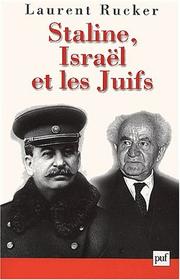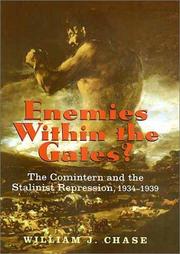| Listing 1 - 10 of 13 | << page >> |
Sort by
|
Book
Year: 1990 Publisher: New York Norton
Abstract | Keywords | Export | Availability | Bookmark
 Loading...
Loading...Choose an application
- Reference Manager
- EndNote
- RefWorks (Direct export to RefWorks)
Book
Year: 1993 Publisher: Princeton, N. J. Princeton University Press
Abstract | Keywords | Export | Availability | Bookmark
 Loading...
Loading...Choose an application
- Reference Manager
- EndNote
- RefWorks (Direct export to RefWorks)
Book
ISBN: 9782757818640 2757818643 Year: 2011 Volume: 437 Publisher: Paris : Points,
Abstract | Keywords | Export | Availability | Bookmark
 Loading...
Loading...Choose an application
- Reference Manager
- EndNote
- RefWorks (Direct export to RefWorks)
Political persecution --- Political atrocities --- Persécutions politiques --- Atrocités politiques --- Stalin, Joseph, --- Soviet Union --- URSS --- Politics and government --- History --- Politique et gouvernement --- Histoire --- Persécutions politiques --- Atrocités politiques --- Soviet Union - Politics and government - 1936-1953 --- URSS - Politique et gouvernement - 1936-1953
Book
ISBN: 9782204101585 2204101583 Year: 2013 Publisher: Paris : Cerf,
Abstract | Keywords | Export | Availability | Bookmark
 Loading...
Loading...Choose an application
- Reference Manager
- EndNote
- RefWorks (Direct export to RefWorks)
En s'appuyant sur des archives, l'étude éclaire la figure de L. Beria, ministre de l'intérieur de l'URSS, écarté par ses collègues en juin 1953. L'analyse de ses réseaux, avant et pendant la guerre, montre le paradoxe de ce personnage qui contribua à renforcer le pouvoir de Staline tout en envisageant de renverser son système, qu'il jugeait absurde, n'hésitant pas à remettre en cause le marxisme.
Politicians --- Secret service --- Hommes politiques --- Service secret --- Biography --- Biographies --- Beriia, L. P. --- Soviet Union --- URSS --- History --- Politics and government --- Histoire --- Politique et gouvernement --- Statesmen --- Berii͡a, Lavrentiĭ Pavlovich, --- Berii͡a, L. P. --- Statesmen - Soviet Union - Biography --- Berii͡a, Lavrentiĭ Pavlovich, - 1899-1953 --- Soviet Union - Politics and government - 1936-1953
Book
ISBN: 9791021002944 Year: 2013 Publisher: Paris : Tallandier,
Abstract | Keywords | Export | Availability | Bookmark
 Loading...
Loading...Choose an application
- Reference Manager
- EndNote
- RefWorks (Direct export to RefWorks)
Portrait de Lavrentij Béria, une des figures clefs du pouvoir soviétique de 1938 à 1953. Son rôle a été primordial dans l'organisation du goulag. En 1953, alors que Staline avait déjà programmé son élimination en montant de toutes pièces un complot, la mort du dictateur le sauvera in extremis. Plusieurs sources suggèrent qu'il en est l'organisateur et peut être même l'exécutant.
Politicians --- Secret service --- Hommes politiques --- Service secret --- Biography --- Biographies --- Staline, Joseph, --- Beriia, L. P. --- Soviet Union --- URSS --- History --- Politics and government --- Histoire --- Politique et gouvernement --- Beriia, L P, --- Berii͡a, L. P. --- Politicians - Soviet Union - Biography --- Beriia, L P, - 1899-1953 - (Lavrentii Pavlovich) --- Soviet Union - Politics and government - 1936-1953 --- Stalin, Joseph,
Book
ISBN: 9782859448974 2859448977 Year: 2015 Publisher: Paris : Publications de la Sorbonne,
Abstract | Keywords | Export | Availability | Bookmark
 Loading...
Loading...Choose an application
- Reference Manager
- EndNote
- RefWorks (Direct export to RefWorks)
Une étude de la répression politique entreprise en URSS, à partir de décembre 1941 jusqu'à la fin de la période stalinienne. Les objectifs qui ont accompagné l'épuration soviétique sont mis en évidence : mobilisation de la société, sécurisation des zones reconquises après la Seconde Guerre mondiale, restauration de l'autorité du Kremlin, influence du contexte international, dimensions symboliques. ©Electre 2015
Political purges --- World War, 1939-1945 --- Purges politiques --- 2ème guerre mondiale --- Collaborationists --- Collaborateurs --- Soviet Union --- URSS --- Politics and government --- Politique et gouvernement --- World War, 1939-1945 - Collaborationists - Soviet Union --- Political purges - Soviet Union --- Soviet Union - Politics and government - 1945-1991 --- Soviet Union - Politics and government - 1936-1953

ISBN: 2130511651 9782130511656 Year: 2001 Publisher: Paris : Presses universitaires de France,
Abstract | Keywords | Export | Availability | Bookmark
 Loading...
Loading...Choose an application
- Reference Manager
- EndNote
- RefWorks (Direct export to RefWorks)
Communism and Zionism --- Jews --- Communisme et sionisme --- Juifs --- Persecutions --- Persécutions --- Soviet Union --- Israel --- Middle East --- URSS --- Israël --- Moyen-Orient --- Foreign relations --- History --- Relations extérieures --- Histoire --- Antisemitism --- Politics and government --- Ethnic relations --- Persécutions --- Israël --- Relations extérieures --- Antisemitism - Soviet Union --- Jews - Persecutions - Soviet Union --- Soviet Union - Politics and government - 1936-1953 --- Soviet Union - Foreign relations - Israel --- Israel - Foreign relations - Soviet Union --- Soviet Union - Ethnic relations

ISBN: 2868690580 9782868690586 Year: 1985 Publisher: Arles Actes sud
Abstract | Keywords | Export | Availability | Bookmark
 Loading...
Loading...Choose an application
- Reference Manager
- EndNote
- RefWorks (Direct export to RefWorks)
Ecrivains français --- Authors, Belgian --- Revolutionaries --- Diaries --- Serge, Victor, --- Soviet Union --- Politics and government --- Revolutionists --- Dissenters --- Counterrevolutionaries --- Belgian authors --- Kibalʹchich, Viktor Lʹvovich, --- Kibaltchitch, Victor-Napoléon Lvovitch, --- Serzh, Viktor, --- Rétif, --- Victor-Serge, --- Diaries. --- Ecrivains français - 20e siècle - Journaux intimes --- Authors, Belgian - 20th century - Diaries --- Revolutionaries - Soviet Union - Diaries --- Serge, Victor, - 1890-1947 - Journal intime --- Serge, Victor, - 1890-1947 - Diaries --- Soviet Union - Politics and government - 1936-1953 --- Serge, Victor, - 1890-1947 --- Political philosophy. Social philosophy --- French literature (outside France)
Book
ISBN: 9782707194312 270719431X Year: 2017 Publisher: Paris : La découverte,
Abstract | Keywords | Export | Availability | Bookmark
 Loading...
Loading...Choose an application
- Reference Manager
- EndNote
- RefWorks (Direct export to RefWorks)
Après la révolution de 1917, le nouveau pouvoir soviétique s'engagea résolument dans la destruction de l'ancien monde et dans la construction du socialisme. Dans le même temps, il construisit à Moscou sa propre maison, sur le site d'un ancien marécage, près de la Moskova. Cet ensemble de 505 appartements équipés, modèle d'une " organisation communiste de la vie quotidienne ", offrait aux hauts représentants du pouvoir bolchevique ainsi qu'à leur famille tous les services : une banque, une bibliothèque, un réfectoire, un théâtre, un bureau de poste, un court de tennis, etc. Ce livre est l'histoire de cette " maison éternelle ", et de tous ceux, hommes, femmes et enfants, qui y ont vécu. Cette grande saga familiale raconte la conversion au bolchevisme des socialistes de la première génération, elle relate l'exécution ou l'emprisonnement de 800 d"entre eux pour trahison pendant les Grandes Purges des années 1937-1938, et s'achève par la foi perdue de leurs enfants, et la fin de l'Union soviétique. Elaboré à partir de sources largement inédites, de lettres, journaux intimes, mémoires et de centaines de photographies, La Maison éternelle est une épopée qui raconte l'histoire de la révolution russe comme personne ne l'avait fait auparavant. Un texte-fleuve dans la grande tradition de L. Tolstoï, A. Soljenitsyne ou V. Grossman, mais aussi un immense livre d'histoire qui éclaire d'un jour nouveau les rapports complexes entre bolchevisme et millénarisme
Millennialism --- Communism --- History --- Moscow (Russia) --- URSS, --- Politique et gouvernement --- --Révolution russe --- --URSS, --- --Millennialism --- --Communists --- Apartment dwellers --- Victims of state-sponsored terrorism --- Apartment houses --- Political purges --- State-sponsored terrorism --- History. --- Soviet Union --- Politics and government --- Buildings, structures, etc. --- Révolution russe --- Communists - Russia (Federation) - Moscow - Biography. --- Apartment dwellers - Russia (Federation) - Moscow - Biography. --- Victims of state-sponsored terrorism - Russia (Federation) - Moscow - Biography. --- Apartment houses - Russia (Federation) - Moscow - History - 20th century. --- Political purges - Soviet Union - History. --- State-sponsored terrorism - Soviet Union - History. --- URSS, 1922-1991 --- Moscow (Russia) - Politics and government - 20th century. --- Moscow (Russia) - Biography. --- Moscow (Russia) - Buildings, structures, etc. --- Soviet Union - Politics and government - 1936-1953. --- Communists

ISBN: 1281731390 9786611731397 0300133197 9780300133196 9780300082425 0300082428 9781281731395 6611731393 Year: 2001 Publisher: New Haven Yale University Press
Abstract | Keywords | Export | Availability | Bookmark
 Loading...
Loading...Choose an application
- Reference Manager
- EndNote
- RefWorks (Direct export to RefWorks)
This compelling work of documentary history tells a story of idealism betrayed, a story of how the Comintern (Communist International), an organization established by Lenin in 1919 to direct and assist revolutionary movements throughout the world, participated in and was ultimately destroyed by the Stalinist repression in the late 1930's. Presenting and drawing on recently declassified archival documents, William J. Chase analyzes the Comintern's roles as agent, instrument, and victim of terror. In both principle and practice, the Comintern was an international organization, with a staff that consisted primarily of Communist émigrés who had fled dictatorial regimes in Europe and Asia. It was, however, headquartered in Moscow and controlled by Soviet leaders. This book examines the rise of suspicions and xenophobia among Soviet and Comintern leaders and cadres for whom many foreigners were no longer the heroes of the class struggle but rather possible enemy agents. Some Comintern members internalized and acted on Stalin's theories about the infiltration of foreign spies into Soviet society, supplying the Soviet police with information that led to the exile or execution of imigris. Thousands of other imigris also became victims of the purges. Together the text and documents of this book convey graphically the essential roles played by the Comintern, providing a unique perspective on the era of Stalinist repression and terror.
Political persecution --- History. --- Communist International --- Communist Information Bureau --- Kyōsan Intānashonaru --- Kyōsan Shugi Intānashonaru --- Bolshevik International --- International Communist Congress --- Red International --- Third Communist International --- Third International --- Tretiĭ Internat︠s︡ional --- International (Third) --- Kommunisticheskiĭ Internat︠s︡ional --- Kommunistische Internationale --- Internazionale comunista --- Коминтерн --- Komintern --- Comintern --- Troisième Internationale --- Dritte Internationale --- Komunistická internacionála --- Třetí Internacionála --- Internacional Comunista --- 3-ĭ Internat︠s︡ional --- Internationale communiste --- I.C. (Communist International) --- IC (Communist International) --- Kommunistiska internationalen --- Terza Internazionale --- Kominterun --- Комунистический интернационал --- Komunisticheskiĭ internat︠s︡ional --- Daisan Intānashonaru --- Konmintan --- Kung chʻan kuo chi --- Kokusai Kyōsantō --- Komintān --- Mosukō Intānashonaru --- Tretja Internacionala --- Komuminterun --- Kommunista Internacionálé --- Communistische Internationale --- Kūmintrun --- كومنترن --- אינטרנצינל הקומוניסטי --- コミンテルン --- 共產國際 --- Tercera Internacional --- Soviet Union --- Politics and government --- Communist International -- History.. --- Political persecution -- Soviet Union -- History.. --- Soviet Union -- Politics and government -- 1936-1953.
| Listing 1 - 10 of 13 | << page >> |
Sort by
|

 Search
Search Feedback
Feedback About UniCat
About UniCat  Help
Help News
News